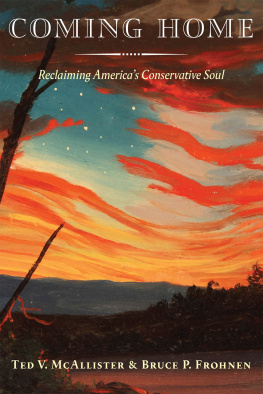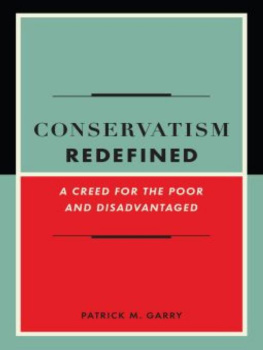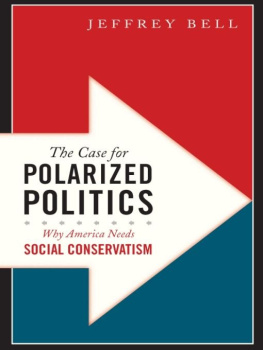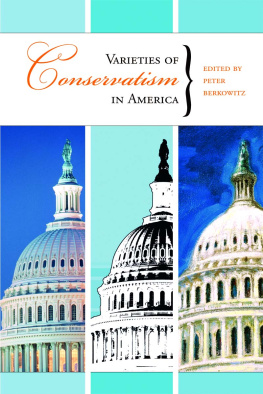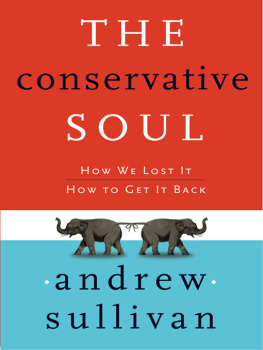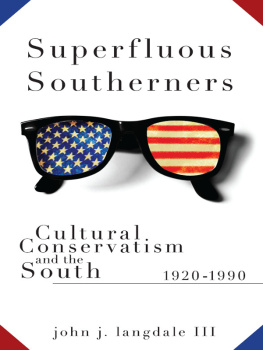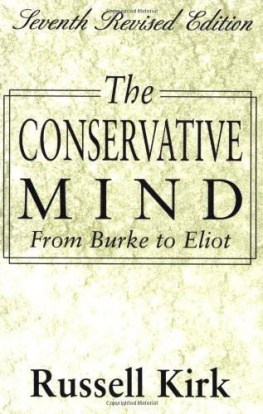
COMING HOME
COMING HOME
Reclaiming Americas Conservative Soul
TED V. MCALLISTER & BRUCE P. FROHNEN
NEW YORK LONDON
2019 by Ted V. McAllister and Bruce P. Frohnen
All rights reserved. No part of this publication may be reproduced, stored in a retrieval system, or transmitted, in any form or by any means, electronic, mechanical, photocopying, recording, or otherwise, without the prior written permission of Encounter Books, 900 Broadway, Suite 601, New York, New York, 10003.
First American edition published in 2019 by Encounter Books, an activity of Encounter for Culture and Education, Inc., a nonprofit, tax exempt corporation.
Encounter Books website address: www.encounterbooks.com
Manufactured in the United States and printed on acid-free paper. The paper used in this publication meets the minimum requirements of ANSI/NISO Z39.481992 (R 1997) (Permanence of Paper).
FIRST AMERICAN EDITION
LIBRARY OF CONGRESS CATALOGING-IN-PUBLICATION DATA
Names: McAllister, Ted V., author. | Frohnen, Bruce, author.
Title: Coming home : reclaiming Americas conservative soul / by Ted V. McAllister and Bruce P. Frohnen.
Description: New York : Encounter Books, [2019] | Includes bibliographical references and index.
Identifiers: LCCN 2018055428 (print) | LCCN 2019002283 (ebook) | ISBN 9781641770576 (ebook) | ISBN 9781641770569 (hardcover : alk. paper)
Subjects: LCSH: ConservatismUnited States. | United StatesPolitics and government--Philosophy. | United StatesSocial policyPhilosophy.
Classification: LCC JC573.2.U6 (ebook) | LCC JC573.2.U6 M358 2019 (print) |
DDC 320.520973dc23
LC record available at https://lccn.loc.gov/2018055428
CONTENTS
PART II: REBUILDING OUR CULTURAL HOME
The Return to Human Nature |
FOR OUR LITTLE PLATOONS.
For Dena, Elisabeth, and Lukas T.V. M.
For Gloria Antonia, Michaela Isobel, and Augustine Burke B.P.F.
Introduction
T he peaceful era of global prosperity declared at the end of the Cold War has ended, if indeed it ever began. We have entered a time of deep cultural conflict forced to the political surface by unprecedented economic dislocation and social change. From serious questions about the viability of the European Union to fits of highly dangerous nationalism in Russia and China, geopolitics bespeaks nothing so clearly as system collapse. Peoples and governments are in crisis.
Even in the United States these forces are at work. The levels of panic evident among so many Americans at the election of Donald Trump, which have continued well into his presidency, are a clear sign of a crisis in our political, social, and even cultural life. Americans lack of trust in our political system, in each other, and in the decency of our way of life are undermining our ability to function as a people. And this distrust stems from deeper, more frightening causes; it is a painful eruption from a civilizational disease. A civilization is diseased when its people lose faith in its essential ideals and institutions, and when its elite loses or distorts its historical memory. This disease eventually produces an ersatz culture so alien to genuine human needs that the people come to lose the feeling of home of belonging and attachment that is any cultures lived reality. Years of leftist attacks on time-honored institutions that have served to knit a nation of patriots and friends out of Americas rich pluralism, combined with a progressive case of historical dementia, have robbed many Americans of our cultural home, our distinctive, rooted, and beautiful tradition as a self-ruling and self-respecting people.
Our ancestors have been turned into a rogues gallery of exploiters and their countless victims a past that our cultural elite tells us is so shameful that loyalty to any of its cultural bequests makes us automatically complicit in the crimes that now constitute our only patrimony. In a civilizational sense, our elite has left us without cultural forebears; they have made us orphans.
Orphans can still find home, security, and the conditions for happiness so long as they retain institutions serving their most human needs. All humans need stable families to help us develop a strong sense of belonging and attachment. We need local, face-to-face associations and institutions that help us form solid characters and secure our identities as persons and members of communities. And we need a sense of purpose linked with our identity. But we American orphans confront an elite culture that, in the name of liberating the individual, dissolves the institutions and structures that help form stable identities. Instead of a cultural home capacious enough to shelter natives and orphans, we have been left with a perverse species of individualism, stripping from us the relationships that give us strength and meaning. The childish rebellion for so long sold to us as liberation has alienated us from our spouses, neighbors, and communities, leaving us free from that which makes life worth living.
The crisis of our time, then, might be called homelessness. Homelessness, in the way we mean it here, is a separation from our true nature or our true selves. To rebuild America requires that we reclaim our heritage and rethink our culture and institutions to allow the natural growth and revitalization of the cultural places where we find our natural home.
In writing this short work about reclaiming conservatism and its principles, we have made the assumption that you, in choosing to read it, already have some understanding of the contemporary crisis. Still, a quick overview of conditions on the ground may highlight key characteristics of the current malaise.
People can only be genuinely happy if they govern themselves, making choices based on an understanding of their full human needs. Those who choose to abuse drugs, or to use their fellow human beings as mere tools of their lust, greed, or feelings of superiority, cannot be truly happy because they are governed by their passions and lack decent character. Trapped in the pursuit of thrills, they lack the self-control and sense of proportion necessary to achieve any sense of satisfaction and genuine hope for the future.
Decent character requires social and cultural supports that help us to become good neighbors and citizens, and in turn to raise our children to be such. Most fundamentally, it requires strong families embedded in thick layers of associations and institutions. To rebuild our lives together we must protect and enliven the spirit of our civil society. But we have material needs as well. Most crucially, people need dignified, productive work so that they can support their families to be part of self-reliant communities and associations. Without both dignified work and meaningful civic engagement, communities crumble, turning self-reliance and happiness into lingering illusions from a desiccated past.
For decades, now, political elites have promised to help our families. Yet, even as our governments take on greater power, they become ever more remote from those they claim to represent and serve. A colossal regulatory system commands our civil society, homogenizing rules, social norms, and the people themselves; it increasingly takes over the roles, the autonomy, and even the purpose of the associations in which we once learned the art, necessity, and rewards of self-rule. This tutelary government (the classic nanny state) actively cooperates with globalized crony capitalism to enforce a perverse individualism rooted in meaningless consumption and fluid identities, robbing us of the means of becoming a happy, self-governing people.
Next page
